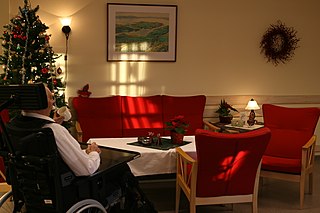Related Research Articles
A television licence or broadcast receiving licence is a payment required in many countries for the reception of television broadcasts or the possession of a television set. In some countries, a licence is also required to own a radio or receive radio broadcasts. In such countries, some broadcasts are funded in full or in part by the licence fees. Licence fees are effectively a hypothecated tax to fund public broadcasting.

Medicare is an unofficial designation used to refer to the publicly funded single-payer healthcare system of Canada. Canada's health care system consists of 13 provincial and territorial health insurance plans, which provide universal healthcare coverage to Canadian citizens, permanent residents, and depending on the province or territory, certain temporary residents. The systems are individually administered on a provincial or territorial basis, within guidelines set by the federal government. The formal terminology for the insurance system is provided by the Canada Health Act and the health insurance legislation of the individual provinces and territories.

The M6 Toll, referred to on signs as the Midland Expressway, and stylised as M6toll, connects M6 Junction 3a at the Coleshill Interchange to M6 Junction 11A at Wolverhampton with 27 miles (43 km) of six-lane motorway.

A nursing home is a facility for the residential care of older people, senior citizens, or disabled people. Nursing homes may also be referred to as care homes, skilled nursing facilities (SNF) or long-term care facilities. Often, these terms have slightly different meanings to indicate whether the institutions are public or private, and whether they provide mostly assisted living, or nursing care and emergency medical care. Nursing homes are used by people who do not need to be in a hospital, but cannot be cared for at home. The nursing home facility nurses have the responsibilities of caring for the patients' medical needs and also the responsibility of being in charge of other employees, depending on their ranks. Most nursing homes have nursing aides and skilled nurses on hand 24 hours a day.
Health insurance or medical insurance is a type of insurance that covers the whole or a part of the risk of a person incurring medical expenses. As with other types of insurance, risk is shared among many individuals. By estimating the overall risk of health risk and health system expenses over the risk pool, an insurer can develop a routine finance structure, such as a monthly premium or payroll tax, to provide the money to pay for the health care benefits specified in the insurance agreement. The benefit is administered by a central organization, such as a government agency, private business, or not-for-profit entity.

Elderly care, or simply eldercare, serves the needs of old adults. It encompasses assisted living, adult daycare, long-term care, nursing homes, hospice care, and home care.

In the British Islands, any household watching or recording television transmissions at the same time they are being broadcast is required by law to hold a television licence. This applies regardless of transmission method, including terrestrial, satellite, cable, or for BBC iPlayer internet streaming. The television licence is the instrument used to raise revenue to fund the BBC; it is considered to be a form of hypothecated taxation.
A public hospital, or government hospital, is a hospital which is government owned and is fully funded by the government and operates solely off the money that is collected from taxpayers to fund healthcare initiatives. In some countries, this type of hospital provides medical care free of charge to patients, covering expenses and wages by government reimbursement.

The Swedish health care system is mainly government-funded, universal for all citizens and decentralized, although private health care also exists. The health care system in Sweden is financed primarily through taxes levied by county councils and municipalities. A total of 21 councils are in charge with primary and hospital care within the country.

Four Seasons Health Care is a British provider of health and social care services. It also owns The Huntercombe Group, a provider of inpatient mental healthcare and brain injury rehabilitation as well as care home operator brighterkind. Four Seasons, as it is today, was created both organically and by the buying out of smaller chains of care homes and rebranding them, as evidenced by the takeovers of Tamaris and Bettercare. At its largest it was the second-biggest care home operator in the UK.

United Kingdom administrative law is part of UK constitutional law that is designed through judicial review to hold executive power and public bodies accountable under the law. A person can apply to the High Court to challenge a public body's decision if they have a "sufficient interest", within three months of the grounds of the cause of action becoming known. By contrast, claims against public bodies in tort or contract are usually limited by the Limitation Act 1980 to a period of 6 years.

A continuing care retirement community (CCRC), sometimes known as a life plan community, is a type of retirement community in the U.S. where a continuum of aging care needs—from independent living, assisted living, and skilled nursing care—can all be met within the community. These various levels of shelter and care may be housed on different floors or wings of a single high-rise building or in physically adjacent buildings, such as garden apartments, cottages, duplexes, mid- and low-rise buildings, or spread out in a campus setting. The emphasis of the CCRC model is to enable residents to avoid having to move, except to another level of care within the community, if their needs change.
In England, social care is defined as the provision of social work, personal care, protection or social support services to children or adults in need or at risk, or adults with needs arising from illness, disability, old age or poverty. The main legal definitions flow from the National Health Service and Community Care Act 1990, with other provisions covering disability and responsibilities to informal carers. That provision may have one or more of the following aims: to protect people who use care services from abuse or neglect, to prevent deterioration of or promote physical or mental health, to promote independence and social inclusion, to improve opportunities and life chances, to strengthen families and to protect human rights in relation to people's social needs.

Iceland has a state-centred, publicly funded universal healthcare system and health insurance that covers the whole population. The number of private providers in Iceland has increased. The healthcare system is largely paid for by taxes (84%) and to some extent by service fees (16%) and is administered by the Ministry of Health. A considerable portion of government spending is assigned to healthcare. There is almost no private health insurance in Iceland and no private hospitals. In very limited cases, access to a private provider can be reimbursement for services provided that the conditions are met.

Healthcare in Belgium is composed of three parts. Firstly there is a primarily publicly funded healthcare and social security service run by the federal government, which organises and regulates healthcare; independent private/public practitioners, university/semi-private hospitals and care institutions. There are a few private hospitals. Secondly is the insurance coverage provided for patients. Finally, industry coverage; which covers the production and distribution of healthcare products for research and development. The primary aspect of this research is done in universities and hospitals.

Illegality is one of the three broad headings of judicial review of administrative action in Singapore, the others being irrationality and procedural impropriety. To avoid acting illegally, an administrative body or public authority must correctly understand the law regulating its power to act and to make decisions, and give effect to it.
The failure of a public authority to take into account relevant considerations and the taking of irrelevant ones into account are grounds of judicial review in Singapore administrative law. They are regarded as forms of illegality.
In 2002, nursing homes in the United Kingdom were officially designated as care homes with nursing, and residential homes became known as care homes.

Healthcare in the British Virgin Islands is predominantly provided by private healthcare providers with an overlay of public support. There is a single public hospital in the British Virgin Islands - Peebles Hospital in Road Town on Tortola. There is also one private hospital - the Bougainvillea clinic. On Anegada, Virgin Gorda and Jost Van Dyke, there are day clinics to serve non-emergency medical needs of residents of those islands. Although there is periodic discussion about the possibility of building another hospital on Virgin Gorda, to date there has been no commitment to doing so. For emergency medical evacuations from other islands a boat is maintained.
The private provision of NHS services has been considered a controversial topic since the early 1990s. Keep Our NHS Public, NHS Support Federation and other groups have campaigned against the threat of privatisation, largely in England.